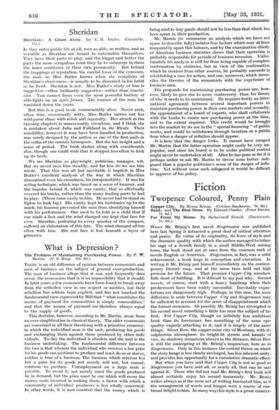What is Depression.?
The Problem of Maintaining Purchasing Power. By P. W. Martin. (P. S. King. 10s. 6d.)
THERE is an old difference of opinion between economists and men of business on the subject of general over-production. The men of business allege that it can, and frequently does occur, the economists that it is an impossibility that it should. In later years a few economists have been found to break away from the orthodox view in one respect or another, but their rebellion has seldom been explicit, and has not touched the fundamental view expressed by Mill that " what constitutes the means of payment for commodities is simply commodities," and that the means of payment are therefore always equal to the supply of goods.
This doctrine, however, according to Mr. Martin, arose from an over-simplification in classical theory. The older economists are concerned in all their theorizing with a primitive economy, in which the individual man is the unit, producing his goods and exchanging them against those produced by other indi- viduals. To-day the individual is obsolete and the unit is the business undertaking. The fundamental difference between the two is that whereas the individual who receives a low price for his goods can continue to produce and must do so or starve, neither is true of a business. The business which receives tco low a price for its goods not merely will not, but cannot; continue to produce. Unemployment on a large scale is possible. To avoid it, not merely must the goods produced be in demand, but the price must be one which will cover the money costs incurred in making them, a factor with which a community of individual producers is less vitally concerned. In other words, it is now essential that the money which is being used to buy goods should not be less than that which has been spent in their production.
Mr. Martin (to summarize an analysis which we have not space to describe fully) isolates four factors which may at least temporarily upset this balance, and by the examination chiefly of American business statistics shows that their operation is probably responsible for periods of business recession. Unfor- tunately his analysis is still far from being capable of complete confirmation by statistics, but in view of the confirmation which he receives from other sources, he probably succeeds in establishing a case for action, and one, moreover, which recon- ciles the theories of the economists with the experience of business men.
His proposals fOr maintaining purchasing power are, how- ever, likely to give rise to more controversy than his theory of why it needs to be maintained. He requires firstly an inter- national agreement between several important powers to maintain purchasing power in their own markets and secondly, the appointment of a board of experts, who shall collaborate with the banks to create new purchasing power at the time, and to the extent required. This credit would be brought into the market by its use in the " special financing " of public works, and would be withdrawn through taxation or a public loan when a danger of inflation should appear. It is here that the danger lurks. It cannot have escaped Mr. Martin that the latter operation might easily be very un- popular, and since his board is to be under political control might never be undertaken at all. After he has gone so far it is perhaps unfair to ask Mr. Martin to devise some better safe- guard than a popular politician's sense of the danger of infla- tion. Yet without some such safeguard it would be difficult to approve of his policy.






































 Previous page
Previous page